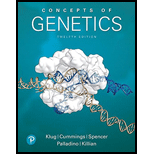
EBK CONCEPTS OF GENETICS
12th Edition
ISBN: 9780134818979
Author: Killian
Publisher: YUZU
expand_more
expand_more
format_list_bulleted
Concept explainers
Textbook Question
Chapter 10, Problem 30PDQ
Because of its rapid turnaround time, fluorescent in situ hybridization (FISH) is commonly used in hospitals and laboratories as an aneuploid screen of cells retrieved from amniocentesis and chorionic villus sampling (CVS). Chromosomes 13, 18, 21, X, and Y (see Chapter 8) are typically screened for aneuploidy in this way. Explain how FISH might be accomplished using amniotic or CVS samples and why the above chromosomes have been chosen for screening.
Expert Solution & Answer
Want to see the full answer?
Check out a sample textbook solution
Students have asked these similar questions
Briefly state the physical meaning of the electrocapillary equation (Lippman equation).
Explain in a small summary how:
What genetic information can be obtained from a Punnet square? What genetic information cannot be determined from a Punnet square?
Why might a Punnet Square be beneficial to understanding genetics/inheritance?
In a small summary write down:
Chapter 10 Solutions
EBK CONCEPTS OF GENETICS
Ch. 10 - Would an experiment similar to that performed by...Ch. 10 - In sea urchin DNA, which is double stranded, 17.5...Ch. 10 - German measles results from an infection of the...Ch. 10 - What vital clues were provided by Franklins work...Ch. 10 - Was it ethical for Wilkins to show Franklins...Ch. 10 - Prob. 3CSCh. 10 - HOW DO WE KNOW? In this chapter, we first focused...Ch. 10 - CONCEPT QUESTION Review the Chapter Concepts list...Ch. 10 - Discuss the reasons proteins were generally...Ch. 10 - Contrast the contributions made to an...
Ch. 10 - When Avery and his colleagues had obtained what...Ch. 10 - Why were 32P and 35S chosen for use in the...Ch. 10 - Does the design of the HersheyChase experiment...Ch. 10 - What observations are consistent with the...Ch. 10 - What are the exceptions to the general rule that...Ch. 10 - Draw the chemical structure of the three...Ch. 10 - How are the carbon and nitrogen atoms of the...Ch. 10 - Adenine may also be named 6-amino purine. How...Ch. 10 - Draw the chemical structure of a dinucleotide...Ch. 10 - Describe the various characteristics of the...Ch. 10 - What evidence did Watson and Crick have at their...Ch. 10 - What might Watson and Crick have concluded had...Ch. 10 - How do covalent bonds differ from hydrogen bonds?...Ch. 10 - List three main differences between DNA and RNA.Ch. 10 - What are the three major types of RNA molecules?...Ch. 10 - How is the absorption of ultraviolet light by DNA...Ch. 10 - What is the physical state of DNA after it is...Ch. 10 - What is the hyperchromic effect? How is it...Ch. 10 - Why is Tm related to base composition?Ch. 10 - What is the chemical basis of molecular...Ch. 10 - What did the WatsonCrick model suggest about the...Ch. 10 - A genetics student was asked to draw the chemical...Ch. 10 - Considering the information in this chapter on B-...Ch. 10 - One of the most common spontaneous lesions that...Ch. 10 - In some organisms, cytosine is methylated at...Ch. 10 - Because of its rapid turnaround time, fluorescent...Ch. 10 - Prob. 31ESPCh. 10 - Newsdate: March 1, 2030. A unique creature has...Ch. 10 - During gel electrophoresis, DNA molecules can...Ch. 10 - DNA and RNA are chemically very similar but are...Ch. 10 - Electrophoresis is an extremely useful procedure...
Knowledge Booster
Learn more about
Need a deep-dive on the concept behind this application? Look no further. Learn more about this topic, biology and related others by exploring similar questions and additional content below.Similar questions
- Not part of a graded assignment, from a past midtermarrow_forwardNoggin mutation: The mouse, one of the phenotypic consequences of Noggin mutationis mispatterning of the spinal cord, in the posterior region of the mouse embryo, suchthat in the hindlimb region the more ventral fates are lost, and the dorsal Pax3 domain isexpanded. (this experiment is not in the lectures).a. Hypothesis for why: What would be your hypothesis for why the ventral fatesare lost and dorsal fates expanded? Include in your answer the words notochord,BMP, SHH and either (or both of) surface ectoderm or lateral plate mesodermarrow_forwardNot part of a graded assignment, from a past midtermarrow_forward
- Explain in a flowcharts organazing the words down below: genetics Chromosomes Inheritance DNA & Genes Mutations Proteinsarrow_forwardplease helparrow_forwardWhat does the heavy dark line along collecting duct tell us about water reabsorption in this individual at this time? What does the heavy dark line along collecting duct tell us about ADH secretion in this individual at this time?arrow_forward
arrow_back_ios
SEE MORE QUESTIONS
arrow_forward_ios
Recommended textbooks for you
 Human Heredity: Principles and Issues (MindTap Co...BiologyISBN:9781305251052Author:Michael CummingsPublisher:Cengage Learning
Human Heredity: Principles and Issues (MindTap Co...BiologyISBN:9781305251052Author:Michael CummingsPublisher:Cengage Learning Biology: The Dynamic Science (MindTap Course List)BiologyISBN:9781305389892Author:Peter J. Russell, Paul E. Hertz, Beverly McMillanPublisher:Cengage Learning
Biology: The Dynamic Science (MindTap Course List)BiologyISBN:9781305389892Author:Peter J. Russell, Paul E. Hertz, Beverly McMillanPublisher:Cengage Learning Biology 2eBiologyISBN:9781947172517Author:Matthew Douglas, Jung Choi, Mary Ann ClarkPublisher:OpenStax
Biology 2eBiologyISBN:9781947172517Author:Matthew Douglas, Jung Choi, Mary Ann ClarkPublisher:OpenStax Biology Today and Tomorrow without Physiology (Mi...BiologyISBN:9781305117396Author:Cecie Starr, Christine Evers, Lisa StarrPublisher:Cengage LearningCase Studies In Health Information ManagementBiologyISBN:9781337676908Author:SCHNERINGPublisher:Cengage
Biology Today and Tomorrow without Physiology (Mi...BiologyISBN:9781305117396Author:Cecie Starr, Christine Evers, Lisa StarrPublisher:Cengage LearningCase Studies In Health Information ManagementBiologyISBN:9781337676908Author:SCHNERINGPublisher:Cengage

Human Heredity: Principles and Issues (MindTap Co...
Biology
ISBN:9781305251052
Author:Michael Cummings
Publisher:Cengage Learning

Biology: The Dynamic Science (MindTap Course List)
Biology
ISBN:9781305389892
Author:Peter J. Russell, Paul E. Hertz, Beverly McMillan
Publisher:Cengage Learning


Biology 2e
Biology
ISBN:9781947172517
Author:Matthew Douglas, Jung Choi, Mary Ann Clark
Publisher:OpenStax

Biology Today and Tomorrow without Physiology (Mi...
Biology
ISBN:9781305117396
Author:Cecie Starr, Christine Evers, Lisa Starr
Publisher:Cengage Learning

Case Studies In Health Information Management
Biology
ISBN:9781337676908
Author:SCHNERING
Publisher:Cengage
Molecular Techniques: Basic Concepts; Author: Dr. A's Clinical Lab Videos;https://www.youtube.com/watch?v=7HFHZy8h6z0;License: Standard Youtube License